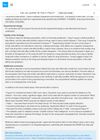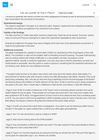 2 citations,
January 2013 in “Hair therapy & transplantation”
2 citations,
January 2013 in “Hair therapy & transplantation” Hair loss may signal metabolic problems and increased risk of heart disease, suggesting people with hair loss should be checked for these issues.
 1 citations,
September 2023 in “Journal of drugs in dermatology”
1 citations,
September 2023 in “Journal of drugs in dermatology” Alopecia areata causes unpredictable hair loss and emotional distress, with no cure and limited treatment options.
 1 citations,
July 2023 in “Cutis”
1 citations,
July 2023 in “Cutis” Scalp rolling might help regrow hair in people with a hair loss condition called Alopecia Areata.
 February 2024 in “Asian journal of medical sciences”
February 2024 in “Asian journal of medical sciences” Proper hygiene, adequate sleep, and self-care can reduce common skin diseases.
 August 2023 in “Physician's journal of medicine”
August 2023 in “Physician's journal of medicine” Hashimoto thyroiditis is an autoimmune disease that can lead to an underactive thyroid and is treated with medication and sometimes diet changes or surgery.
 October 2022 in “Journal of experimental and clinical medicine”
October 2022 in “Journal of experimental and clinical medicine” Repurposing existing drugs for COVID-19 shows promise but requires more research to confirm effectiveness.

 May 2018 in “Actas Dermo-Sifiliográficas”
May 2018 in “Actas Dermo-Sifiliográficas” The Spanish version of the Hair Specific Skindex-29 is a reliable tool for measuring quality of life in Spanish-speaking women with hair loss.
 October 2008 in “The Journal of Urology”
October 2008 in “The Journal of Urology” Finasteride reduces prostate cancer risk but may increase high-grade tumors and has side effects; biopsy methods have similar outcomes; psychosocial factors affect sexual recovery post-surgery.
 205 citations,
September 2018 in “Nutrients”
205 citations,
September 2018 in “Nutrients” Essential oils from Curcuma species, like turmeric, have compounds that can fight inflammation, cancer, and bacteria, and can also stimulate hair regrowth in bald males.
 59 citations,
August 2004 in “Human Reproduction Update”
59 citations,
August 2004 in “Human Reproduction Update” Testosterone replacement can help women with low libido and mood, but they need to have enough estrogen first to avoid side effects.
 1 citations,
January 1998 in “Journal of Investigative Dermatology”
1 citations,
January 1998 in “Journal of Investigative Dermatology” Male pattern hair loss affects about one-third of men aged 18-49 years in the United States.
 December 2023 in “Journal of Drugs in Dermatology”
December 2023 in “Journal of Drugs in Dermatology” Media coverage increased public interest in oral minoxidil for hair loss but may also spread misinformation.
January 1998 in “Dermatologic Surgery” 20 citations,
March 2021 in “Drug design, development and therapy” Topical immunotherapy can treat alopecia areata, but its effectiveness varies and the exact mechanism is unclear.

Celiac disease requires more than just a gluten-free diet for effective management.
 26 citations,
October 2021 in “Current Dermatology Reports”
26 citations,
October 2021 in “Current Dermatology Reports” Social media is increasingly used in dermatology for education and networking but has risks like misinformation and privacy issues.
18 citations,
August 2011 in “Medical Hypotheses” Physical inactivity is a primary cause of many human illnesses.
17 citations,
January 2019 in “Journal of cutaneous medicine and surgery” JAK inhibitors show promise for treating hair loss in alopecia areata but need more clinical trials to confirm safety and effectiveness.
5 citations,
May 2022 in “International Journal of Surgery Case Reports” Pericardiocentesis and immunosuppressants effectively treat cardiac tamponade in pregnant women with SLE.
3 citations,
October 2020 in “Arthritis Care & Research” New tools and criteria have been developed to better assess and treat pediatric lupus.
1 citations,
December 2023 in “Molecules/Molecules online/Molecules annual” JAK inhibitors show promise for treating various skin diseases.

People on Reddit generally have positive opinions about hair loss treatments.
July 2023 in “Annals of African Medicine” Proper periodontal treatment with xenograft effectively manages aggressive periodontitis in SLE patients.
May 2023 in “Clinical and translational neuroscience” Tailored neurorehabilitation programs improve life quality for post-COVID-19 patients.
January 2022 in “Clinical Cases in Dermatology” A 22-year-old man has alopecia areata, an autoimmune hair loss condition, with various treatments available.
 October 2016 in “Journal of the Dermatology Nurses’ Association”
October 2016 in “Journal of the Dermatology Nurses’ Association” Polycystic Ovary Syndrome (PCOS) affects 6%-15% of women of reproductive age, causing symptoms like acne and hair loss, and increasing the risk of type 2 diabetes and heart disease; it's managed through diet, exercise, and medications like Metformin and hormonal contraceptives.

Reviewers criticized the study for its assumptions, social media data collection issues, and lack of comparison to existing methods.

Reviewers criticized the study for assuming drugs with similar side-effects work the same way and questioned the validity of its findings due to potential biases and data quality issues.
56 citations,
October 2016 in “Journal of dermatological science” New insights into the causes and treatments for the autoimmune hair loss condition Alopecia areata have been made.


















